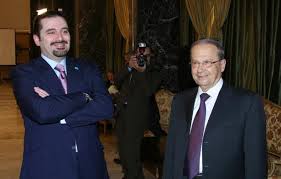BEIRUT: The rift between President Michel Aoun and Prime Minister-designate Saad Hariri over the formation of Lebanon’s new government widened on Friday.

Hariri was instructed to form a new government on Oct. 22, but no progress has yet been made, leaving the country in a political deadlock to add to its economic woes and the challenges presented by the COVID-19 pandemic.
Video footage was broadcast on Jan. 11 of a meeting between Aoun and the caretaker prime minister, Hassan Diab, in which Aoun accused Hariri of lying when he claimed that his proposed government lineup had been approved. Commentators have claimed that, in doing so, Aoun insulted the office of prime minister and head of government, thus widening the gulf between the president and the prime minister-designate. Over the past 10 days, several attempts to bridge that gap have failed.
On Friday, Aoun’s media office issued a statement in response to what it described as “analyses and articles suggesting that the president is the one who is putting obstacles in the face of the PM-designate to obstruct the government formation process.”
“The president did not ask for the obstructing third in the government,” the statement said, adding that “the head of the Strong Lebanon bloc, MP Gebran Bassil, did not obstruct the formation of the government, nor was he involved in this process at all.” Bassil is the leader of the Free Patriotic Movement and Aoun’s son-in-law.
The media office also denied that Hezbollah is “putting pressure on the president in the government formation matter.”
The statement said that “naming, nominating, and distributing the ministers to ministerial portfolios is not an exclusive right for the prime minister-designate, based on two articles in the Constitution,” adding that the president “has a constitutional right to approve the entire government before signing.”
“The president does not have to repeat his call on the prime minister-designate to go to the Baabda Palace, which is waiting for his arrival with a government lineup that takes into account the standards of fair representation in accordance with the provisions of the Constitution, especially in light of the extremely pressing circumstances — on more than one level — to form the government,” the statement continued.
Hariri’s media advisor, Hussein Al-Wajh, said he was “surprised” by the statement issued by the presidency, and questioned whether it had been issued “on behalf of Gebran Bassil and not the president.”
Al-Wajh told Arab News: “No one is arguing about the powers of the president, but this has to do with issuing a decree to form the government in agreement with the prime minister-designate and signing the formation decree after the prime minister conducts parliamentary consultations to form the government.”
He continued: “Since the circumstances are extremely pressing, perhaps those concerned should go with the prime minister-designate’s (suggested) government lineup, which takes into account fair representation according to the constitution, not according to political and partisan quotas.”
Al-Wajh indicated that Hariri would not be willing to change his proposed lineup. “His aim is to form a government based on the standards of the constitution, the national interest, and the rules laid down by the French initiative. The problem is not with Hariri, but with Aoun, who objects and says he does not agree to this or that name, but gives no reason for his objections.”
MP Sami Fatfat, a member of the Future parliamentary bloc, said: “We have arrived at a deadlock between us and the president and we cannot overcome it. The president has the right and duty to debate all the names proposed in the formation process, but instead of debating, he has presented a proposal that is not based on the constitution.”
He went on to accuse the president of failing to act in accordance with the protocols of his position. “President Aoun must know that 65 MPs have assigned Hariri to head the government,” he said. “The president today acts as a party and as a head of a political party, not as a president entrusted with the constitution.”
Elsewhere on Friday, the regional director of the Mashreq department at the World Bank Group, Saroj Kumar Jha, stressed that the bank remains committed to discussions with Lebanon’s leaders about ways to strengthen the country’s economy and improve the lives of the many people in Lebanon who are living below the poverty line.
“The World Bank is greatly concerned and feels a responsibility to help to form the government,” Jha told Lebanon’s Central News Agency. “Things are getting worse by the day .”
Arab News

Leave a Reply
You must be logged in to post a comment.